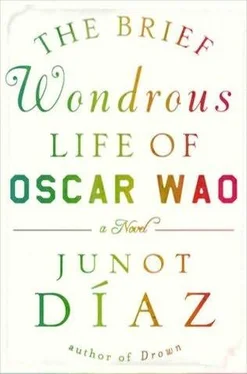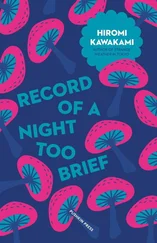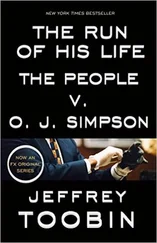Maybe, he wrote on the back of his hairy hand. Maybe.
SANTO DOMINGO CONFIDENTIAL
In some ways living in Santo Domingo during the Trujillato was a lot like being in that famous Twilight Zone episode that Oscar loved so much, the one where the monstrous white kid with the godlike powers rules over a town that is completely isolated from the rest of the world, a town called Peaksville. The white kid is vicious and random and all the people in the ‘community’ live in straight terror of him, denouncing and betraying each other at the drop of a hat in order not to be the person he maims or, more ominously, sends to the corn. (After each atrocity he commits whether it’s giving a gopher three heads or Baníshing a no longer interesting playmate to the corn or raining snow down on the last crops—the horrified people of Peaksville have to say, It was a good thing you did, Anthony. A good thing.)
Between 1930 (when the Failed Cattle Thief seized power) and 1961 (the year he got blazed) Santo Domingo was the Caribbean’s very own Peaksville, with Trujillo playing the part of Anthony and the rest of us reprising the role of the Man Who Got Turned into Jack-in-the-Box. You might roll your eyes at the comparison, but, friends: it would be hard to exaggerate the power Trujillo exerted over the Dominican people and the shadow of fear he cast throughout the region. Homeboy dominated Santo Domingo like it was his very own private Mordor;↓ not only did he lock the country away from the rest of the world, isolate it behind the Plátano Curtain, he acted like it was his very own plantation, acted like he owned everything and everyone, killed whomever he wanted to kill, sons, brothers, fathers, mothers, took women away from their husbands on their wedding nights and then would brag publicly about ‘the great honeymoon’ he’d had the night before.
≡ Anthony may have isolated Peaksville with the power of his mind, but Trujillo did the same with the power of his office! Almost as soon as he grabbed the presidency, the Failed Cattle Thief sealed the country away from the rest of the world—a forced isolation that we’ll call the Plátano Curtain. As for the country’s historically fluid border with Haiti—which was more baká than border—the Failed Cattle Thief became like Dr. Gull in From Hell; adopting the creed of the Dionyesian Architects, he aspired to become an architect of history, and through a horrifying ritual of silence and blood, machete and perejil, darkness and denial, inflicted a true border on the countries, a border that exists beyond maps, that is carved directly into the histories and imaginaries of a people. By the middle of T-illo’s second decade in ‘office’ the Platano Curtain had been so successful that when the Allies won World War II the majority of the pueblo didn’t even have the remotest idea that it had happened. Those who did know believed the propaganda that Trujillo had played an important role in the overthrow of the Japanese and the Hun. Homeboy could not have had a more private realm had he thrown a force-field around the island. (After all, who needs futuristic generators when you have the power of the machete?) Most people argue that El Jefe was trying to keep the world out; some, however, point out that he seemed equally intent on keeping something in.
His Eye was everywhere; he had a Secret Police that out-Stasi’d the Stasi, that kept watch on everyone, even those everyone’s who lived in the States; a security apparatus so ridiculously mongoose that you could say a bad thing about El Jefe at eight-forty in the morning and before the clock struck ten you’d be in the Cuarenta having a cattleprod shoved up your ass. (Who says that we Third World people are inefficient?) It wasn’t just Mr. Friday the Thirteenth you had to worry about, either, it was the whole Chivato Nation he helped spawn, for like every Dark Lord worth his Shadow he had the devotion of his people.↓
≡ So devoted was the pueblo, in fact, that, as Galíndez recounts in La Era de Trujillo , when a graduate student was asked by a panel of examiners to discuss the pre-Columbian culture in the Americas, he replied without hesitation that the most important pre-Columbian culture in the Americas was ‘the Dominican Republic during the era of Trujillo’. Oh, man. But what’s more hilarious is that the examiners refused to fail the student, on the grounds that ‘he had mentioned El Jefe’.
It was widely believed that at anyone time between forty-two and eighty-seven percent of the Dominican population was on the Secret Police’s payroll. Your own fucking neighbors could acabar con you just because you had something they coveted or because you cut in front of them at the colmado. Mad folks went out in that manner, betrayed by those they considered their panas, by members of their own families, by slips of the tongue. One day you were a law-abiding citizen, cracking nuts on your galería, the next day you were in the Cuarenta, getting your nuts cracked. Shit was so tight that many people actually believed that Trujillo had supernatural powers! It was whispered that he did not sleep, did not sweat, that he could see, smell, feel events hundreds of miles away, that he was protected by the most evil fukú on the Island. (You wonder why two generations later our parents are still so damn secretive, why you’ll find out your brother ain’t your brother only by accident.)
But let’s not go completely overboard: Trujillo was certainly formidable, and the regime was like a Caribbean Mordor in many ways, but there were plenty of people who despised El Jefe, who communicated in less-than-veiled ways their contempt, who resisted . But Abelard was simply not one of them. Homeboy wasn’t like his Mexican colleagues who were always keeping up with what was happening elsewhere in the world, who believed that change was possible. He didn’t dream of revolution, didn’t care that Trotsky had lived and died not ten blocks from his student pension in Coyoacán; wanted only to tend his wealthy, ailing patients and afterward return to his study without worrying about being shot in the head or thrown to the sharks. Every now and then one of his acquaintances—usually Marcus—would describe for him the latest Trujillo Atrocity: an affluent clan stripped of its properties and sent into exile, an entire family fed piece by piece to the sharks because a son had dared compare Trujillo to Adolf Hitler before a terrified audience of his peers, a suspicious assassination in Bonao of a well-known unionist. Abelard listened to these horrors tensely, and then after an awkward silence would change the subject. He simply didn’t wish to dwell on the fates of Unfortunate People, on the goings-on in Peaksville. He didn’t want those stories in his house. The way Abelard saw it—his Trujillo philosophy, if you will—he only had to keep his head down, his mouth shut, his pockets open, his daughters hidden for another decade or two. By then, he prophesied, Trujillo would be dead and the Dominican Republic would be a true democracy.
Abelard, it turned out, needed help in the prophecy department. Santo Domingo never became a democracy. He didn’t have no couple of decades, either. His luck ran out earlier than anyone expected.
Nineteen forty-five should have been a capital year for Abelard and Family. Two of Abelard’s articles were published to minor acclaim, one in the prestigious—and the second in a small journal out of Caracas, and he received complimentary responses from a couple of Continental doctors, very flattering indeed. Business in the supermercados couldn’t have been better; the Island was still flush from the war boom and his managers couldn’t keep anything on the shelves. The fincas were producing and reaping profits; the worldwide collapse of agricultural prices was still years off Abelard had a full load of clients, performed a number of tricky surgeries with impeccable skill; his daughters were prospering (Jacquelyn had been accepted at a prestigious boarding school in Le Havre, to begin the following year—her chance to escape); his wife and mistress were pouring on the adoration; even the servants seemed content (not that he ever really spoke to them). All in all, the good doctor should have been immensely satisfied with himself. Should have ended each day with his feet up, un cigarro in the comer of his mouth, and a broad grin creasing his ursine features.
Читать дальше







![О Генри - Недолгий триумф Тильди [The Brief Debut of Tildy]](/books/415353/o-genri-nedolgij-triumf-tildi-the-brief-debut-of-thumb.webp)




